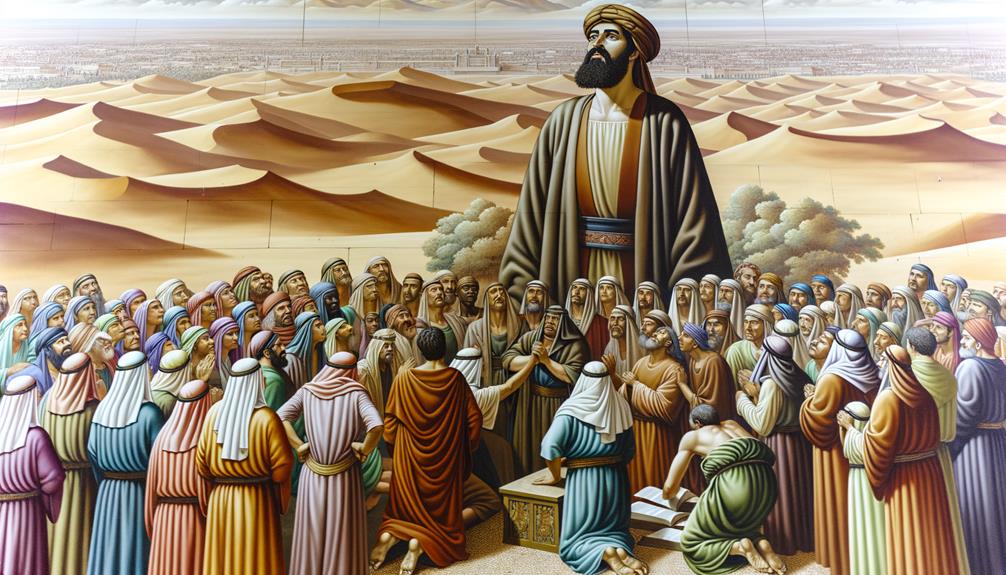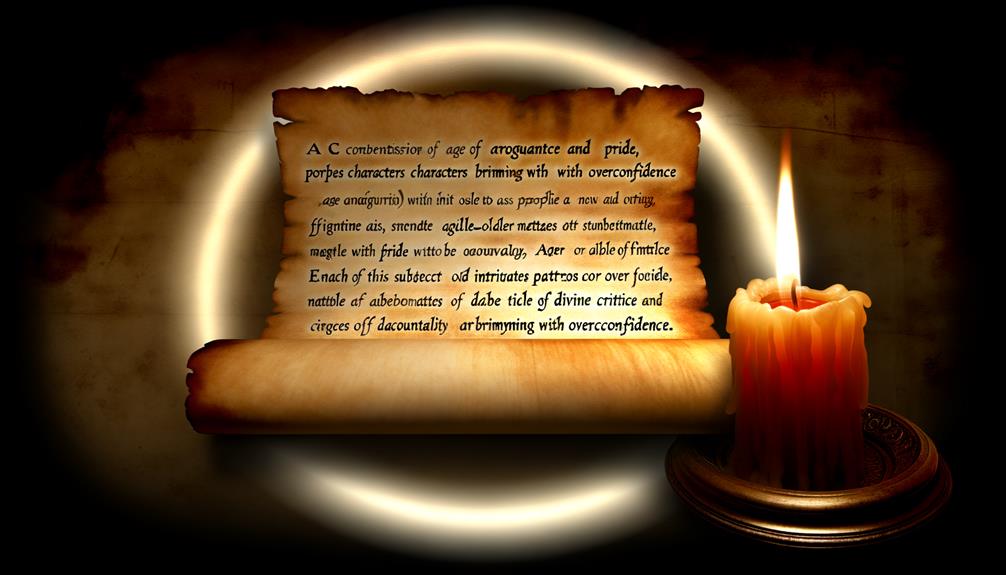Haughty Meaning in the Bible: Warning Against Pride
In the Bible, the term ‘haughty’ denotes an attitude of arrogant superiority and disdain for others, which starkly opposes the humility championed throughout Scripture. It is often associated with a heart posture that elevates self above others and even above God, disrupting communal harmony and spiritual integrity.
Key biblical texts, such as Proverbs 16:18 and Isaiah 2:11-12, warn of the dire consequences of such pride, indicating that it is a grievous sin against divine authority. Understanding the theological implications of haughtiness can reveal much about our spiritual posture and divine expectations.

Haughty Meaning in the Bible: Definition and Spiritual Significance
| Aspect | Details |
|---|---|
| Biblical Term | Haughty |
| Definition | Arrogantly superior and disdainful |
| Hebrew/Greek Root | Hebrew: gabah (to be high, exalted) |
| Biblical Usage | Often used to describe prideful people God opposes |
| Key Verses | Proverbs 6:17, Isaiah 2:11, Romans 12:16 |
| Spiritual Warning | God resists the proud but gives grace to the humble |
| Moral Lesson | Encourages humility and dependence on God |
Definition of Haughty in Scripture

In Scripture, the term ‘haughty‘ is often used to describe an attitude of arrogant superiority and disdain towards others, which is consistently condemned throughout the biblical text. This term encapsulates an overbearing pride and self-importance that stands in stark contrast to the humility and meekness that Scripture advocates.
Theologically, haughtiness denotes a heart posture that elevates oneself above others and, ultimately, above God. This arrogance disrupts communal harmony and spiritual integrity, leading to moral and social decay.
The biblical narrative frames haughtiness as a grievous sin, reflecting a rebellious spirit against divine authority and wisdom. Therefore, understanding ‘haughty’ in its scriptural context underscores the inherent dangers of pride and the necessity of cultivating humility.
Old Testament References

Exploring Old Scriptures references, the term ‘haughty’ frequently appears in prophetic literature, particularly in the context of divine judgment against prideful nations and individuals.
The Old Covenant underscores the consequences of haughtiness through various passages:
- Isaiah 2:11-12: God humbles the haughty and brings low the pride of men.
- Proverbs 16:18: ‘Pride goes before destruction, a haughty spirit before a fall.’
- Ezekiel 28:2: The haughtiness of the King of Tyre is condemned as he exalts himself as a god.
- Obadiah 1:3-4: Edom’s arrogance and false sense of security lead to its downfall.
These examples illustrate the biblical principle that arrogance invites divine retribution, emphasizing humility as a virtue.
New Testament Teachings

The New Covenant continues to address the theme of haughtiness, emphasizing its incompatibility with Christian humility and the teachings of Jesus Christ. The New Scripture repeatedly underscores the necessity of humility, as exemplified by Christ himself.
Scriptural passages admonish believers to eschew arrogance and embrace servitude, reflecting the ethos of the Kingdom of God. Remarkably, the Beatitudes (Matthew 5:3-12) contrast the blessedness of the humble with the downfall of the prideful.
Similarly, James 4:6-10 warns against pride, advocating submission to God. The Apostle Paul also addresses this issue, urging Christians to adopt a mindset of humility (Philippians 2:3-8).
| Scripture Reference | Teaching on Haughtiness |
|---|---|
| Matthew 5:3-12 | Blessed are the humble |
| James 4:6-10 | God opposes the proud |
| Philippians 2:3-8 | Christ’s humility |
| 1 Peter 5:5 | Clothe yourselves with humility |
Haughty Vs. Humble

Contrasting the traits of haughtiness with humility reveals fundamental theological principles that are essential for understanding Christian discipleship.
Haughtiness, characterized by arrogance and self-exaltation, directly opposes the Christian virtue of humility. Scriptural teachings consistently highlight the importance of humility through the example and teachings of Jesus Christ.
Key theological principles include:
- Dependence on God: Humility emphasizes reliance on God rather than self.
- Community Harmony: Humble individuals foster unity and peace within the Christian community.
- Christ-like Living: Jesus exemplified humility by serving others, a model for believers.
- Divine Favor: Humble hearts attract God’s grace and blessings, as stated in James 4:6, ‘God opposes the proud but gives grace to the humble.’
Understanding these distinctions is crucial for authentic Christian discipleship.
Consequences of Haughtiness

The Bible consistently warns against haughtiness, emphasizing that it incurs divine displeasure and subsequent punishment, as seen in passages like Proverbs 16:18, ‘Pride goes before destruction, a haughty spirit before a fall.’
Additionally, arrogance often leads to social isolation and downfall, as it fosters discord and alienates individuals from their communities, echoing the admonitions found in scriptures such as Proverbs 11:2.
Therefore, the biblical narrative underscores the severe repercussions of prideful behavior, both in divine judgment and societal consequences.
Divine Displeasure and Punishment
Scriptural narratives consistently illustrate that divine displeasure accompanies haughtiness, often resulting in severe consequences for those who exhibit such arrogance. The Bible offers numerous instances where God’s judgment is meted out against the proud, emphasizing the gravity of haughtiness:
- Destruction of Sodom and Gomorrah – The pride of these cities led to their catastrophic annihilation (Genesis 19:24-25).
- King Nebuchadnezzar – His arrogance resulted in his temporary insanity and loss of kingdom (Daniel 4:30-33).
- Pharaoh of Egypt – His haughty heart brought about plagues and the eventual downfall of his empire (Exodus 7-12).
- Lucifer’s Fall – The epitome of haughtiness, leading to his expulsion from heaven (Isaiah 14:12-15).
Social Isolation and Downfall
Manifesting as a profound social repercussion, haughtiness often precipitates isolation and downfall, as illustrated by numerous biblical accounts. Proverbs 16:18 asserts, “Pride goes before destruction, and a haughty spirit before a fall.” This scripture underscores the inevitable consequences of arrogance, leading to alienation from both God and community.
The narrative of King Nebuchadnezzar in Daniel 4 epitomizes this principle; his prideful declaration resulted in his temporary descent into madness and exile. Similarly, Isaiah 2:11-12 prophesies the humbling of the haughty on the Day of the Lord, emphasizing divine retribution and social ostracism.
Consequently, biblical texts consistently warn of the perilous outcomes of haughty behavior, advocating humility as a virtue that fosters communal harmony and divine favor.
Biblical Examples of Haughty Individuals

Several prominent figures in the Bible serve as illustrative examples of haughty individuals, whose pride and arrogance ultimately led to their downfall. These narratives not only highlight the perils of haughtiness but also serve as moral lessons for the faithful.
- Pharaoh of Egypt: His refusal to free the Israelites, despite witnessing divine plagues, exemplifies extreme pride (Exodus 5-12).
- King Nebuchadnezzar: His boastful declaration of Babylon’s grandeur led to his temporary insanity (Daniel 4).
- Haman: His egotistical desire for honor resulted in his execution on the gallows he built for Mordecai (Esther 7).
- King Uzziah: His prideful attempt to burn incense in the temple led to his affliction with leprosy (2 Chronicles 26:16-21).
These accounts underscore the Biblical admonition against haughtiness.
Haughty Nations in the Bible

The Bible provides compelling narratives of entire nations characterized by haughtiness, leading to their eventual downfall.
Babylon’s arrogant defiance against God, Israel’s moral decline despite repeated divine warnings, and Assyria’s overbearing pride, as chronicled in prophetic texts, serve as poignant examples.
These instances underscore the universal biblical principle that national pride and self-exaltation invite divine judgment.
Babylon’s Arrogant Downfall
Examining the fate of Babylon reveals a profound biblical lesson on the consequences of national haughtiness and divine justice. Babylon’s fall is a reflection of the perils of pride as depicted in Isaiah 13:19 and Jeremiah 50:31-32.
The Bible highlights four key aspects of Babylon’s downfall:
- Pride and Arrogance: Babylon’s leaders exalted themselves, ignoring their dependence on God (Isaiah 14:13-14).
- Divine Judgment: Their hubris invited God’s retribution, leading to their ultimate destruction (Isaiah 47:10-11).
- Inevitable Fall: Despite their power, Babylon’s collapse was certain (Jeremiah 51:58).
- Moral Lesson: Their downfall serves as a moral instruction against national haughtiness, emphasizing humility before God.
This narrative underscores the biblical principle that no nation, however mighty, is beyond divine accountability.
Israel’s Moral Decline
How did Israel, once chosen and blessed by God, succumb to moral decline and haughtiness, mirroring the very nations it was meant to stand apart from?
Scriptural accounts reveal a progressive departure from covenantal faithfulness, as seen in the prophetic denunciations of Isaiah (Isaiah 1:4) and Jeremiah (Jeremiah 2:19).
The Israelites’ adoption of idolatrous practices (1 Kings 14:23) and social injustices (Amos 5:12) reflected a deep-seated pride and self-reliance, contradicting their dependence on Yahweh.
This moral decline and haughtiness led to divine judgments, such as the Babylonian exile (2 Kings 25:1-21), underscoring the biblical principle that pride precedes downfall (Proverbs 16:18).
Consequently, Israel’s history serves as a cautionary tale of the perils of forsaking divine ordinances.
Assyria’s Overbearing Pride
Assyria’s overbearing pride, exemplified through its imperial conquests and self-aggrandizing rhetoric, is starkly condemned in the prophetic literature of the Old Scriptures.
Prophets like Isaiah and Nahum denounce Assyria’s arrogance, predicting divine retribution against its hubris.
Assyria’s pride is illustrated through:
- Boastful Kings: Assyrian monarchs, such as Sennacherib, exalted themselves above all nations (Isaiah 36:4).
- Military Conquests: Their relentless expansion and brutal tactics fostered an image of invincibility (Isaiah 10:12-14).
- Idolatrous Practices: Assyria’s worship of false gods is portrayed as an affront to the sovereignty of Yahweh (Nahum 1:14).
- Divine Judgment: Prophetic texts foretell Assyria’s downfall as a divine act of justice (Nahum 3:18-19).
These elements collectively spotlight Assyria as a paradigm of haughty nations destined for divine chastisement.
Lessons on Humility

In the Bible, lessons on humility are intricately woven through narratives and teachings, emphasizing the virtue as a cornerstone of righteous living.
The humility of Christ, exemplified in Philippians 2:5-8, serves as the ultimate paradigm; He humbled Himself by taking on human form and submitting to death on a cross.
Similarly, the parable of the Pharisee and the tax collector (Luke 18:9-14) illustrates God’s favor towards the humble.
Proverbs 11:2 asserts, ‘When pride comes, then comes disgrace, but with humility comes wisdom.’
These scriptural teachings underscore that true humility entails recognizing one’s limitations and dependence on God, fostering a life marked by meekness, gratitude, and reverence.
Spiritual Implications

The spiritual implications of haughtiness in the Bible are profound, encompassing clear biblical warnings against pride, the exaltation of humility as a virtue, and stark consequences for arrogance.
Scripture consistently admonishes against a haughty spirit, as seen in Proverbs 16:18, which states, ‘Pride goes before destruction, a haughty spirit before a fall.’
Additionally, the Beatitudes in Matthew 5 extol the meek, underscoring humility as essential for spiritual well-being.
Biblical Warnings Against Pride
Scripture consistently admonishes believers to guard against pride, warning that it leads to spiritual downfall and separation from God. The Bible provides numerous admonitions and examples that illustrate the perilous nature of pride:
- Proverbs 16:18: ‘Pride goes before destruction, a haughty spirit before a fall,’ underscoring the inevitable downfall pride brings.
- Isaiah 2:11: ‘The eyes of the arrogant will be humbled,’ indicating divine judgment against the proud.
- James 4:6: ‘God opposes the proud but gives grace to the humble,’ highlighting God’s resistance to pride.
- 1 Peter 5:5: ‘Clothe yourselves with humility,’ advising believers to actively reject pride.
These passages affirm the serious spiritual implications of pride, urging a posture of humility before God.
Humility as a Virtue
Recognizing the dangers of pride, believers are called to embrace humility, which is consistently extolled as a foundational virtue for spiritual growth and alignment with God’s will.
Scriptural passages such as James 4:10, ‘Humble yourselves before the Lord, and he will lift you up,’ highlight the divine preference for humility. This virtue reflects a heart attuned to God’s sovereignty, acknowledging human limitations and dependence on divine grace.
Philippians 2:3-4 further exhorts believers to ‘in humility value others above yourselves,’ underlining humility’s communal aspect.
Theologically, humility fosters an environment where spiritual fruits can flourish, ensuring a life in harmony with God’s purposes.
Consequently, humility is not merely a moral attribute but a spiritual imperative essential for authentic discipleship.
Consequences of Arrogance
How does arrogance disrupt the spiritual harmony that humility seeks to cultivate?
Arrogance, as addressed in scripture, poses significant spiritual ramifications. It severs the individual’s connection to divine grace and fosters a spirit of self-reliance over godly dependence. This disruption manifests in several ways:
- Alienation from God: Proverbs 16:5 states, ‘Everyone who is arrogant in heart is an abomination to the Lord.’
- Breakdown of Community: Arrogance breeds division, impairing the unity of the body of Christ (1 Corinthians 12:25).
- Hindrance to Wisdom: Proverbs 11:2 notes that with arrogance comes disgrace, but with humility comes wisdom.
- Invitation to Downfall: Proverbs 16:18 warns, ‘Pride goes before destruction, and a haughty spirit before a fall.’
Understanding these consequences illuminates the profound need for humility.
Cultivating a Humble Heart

Embracing humility as a core virtue requires a deep, introspective journey grounded in biblical teachings and divine wisdom. Scripture consistently extols humility, as exemplified in Philippians 2:3, which urges believers to ‘esteem others better than themselves.’
Developing a humble heart necessitates recognizing one’s dependence on God, as articulated in James 4:10: ‘Humble yourselves before the Lord, and he will lift you up.’ This transformation involves a conscious abandonment of self-exaltation and a commitment to servanthood, mirroring Christ’s humility in John 13:14-15.
Practicing humility also entails seeking forgiveness and extending grace, fostering a spirit of unity and love within the community. Therefore, cultivating a humble heart aligns believers with divine will and fosters spiritual growth.
Conclusion
The tale of the haughty spirit serves as a cautionary beacon, illuminating the perilous path of pride that leads to ruin.
Scriptural narratives juxtapose the haughty with the humble, revealing divine favor towards the latter. The ancient texts admonish the faithful to eschew arrogance and embrace humility, fostering a heart aligned with divine will.
Consequently, the spiritual journey mandates the cultivation of humility, mirroring the meekness of the shepherd, and securing the soul’s sanctuary in eternal grace.






